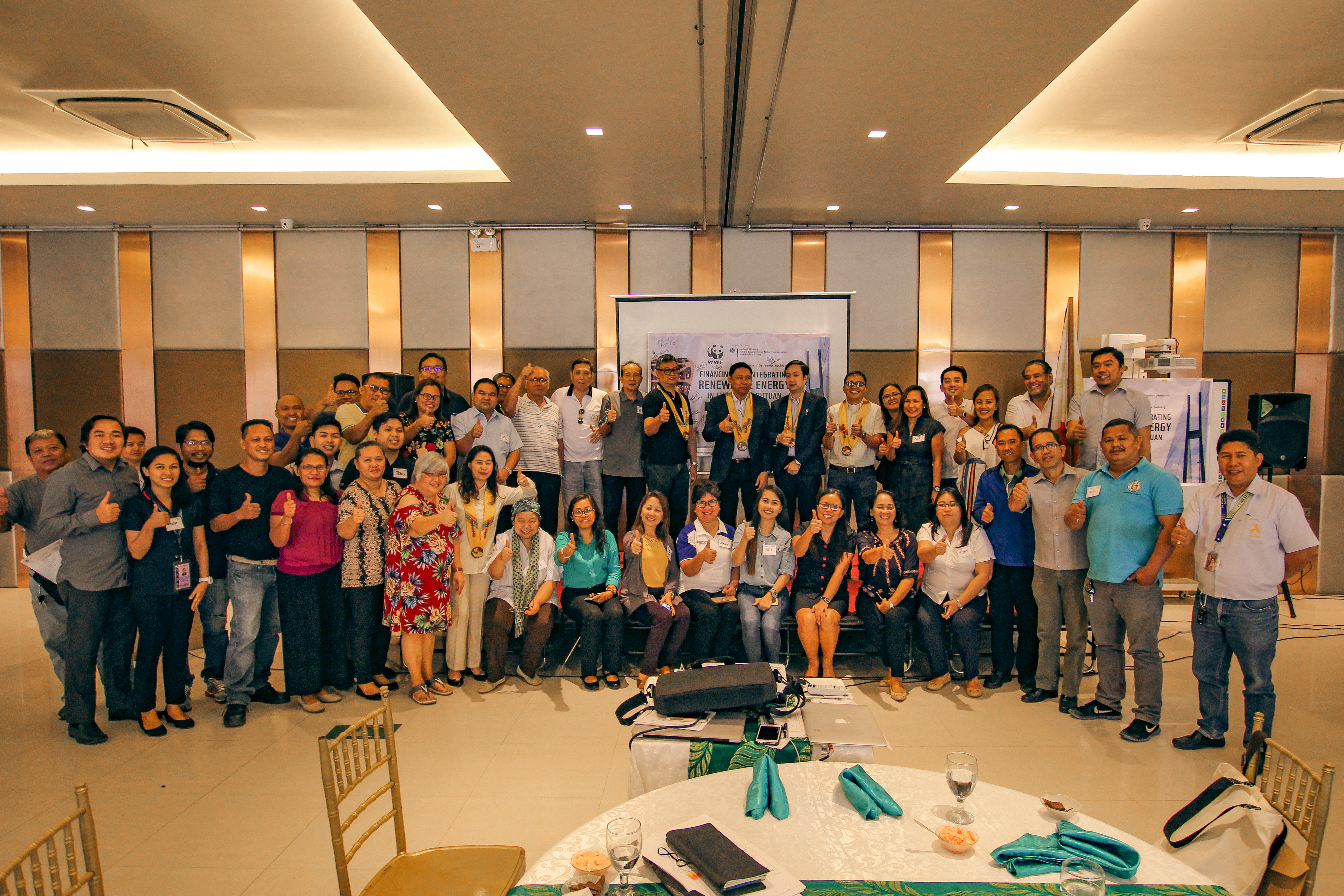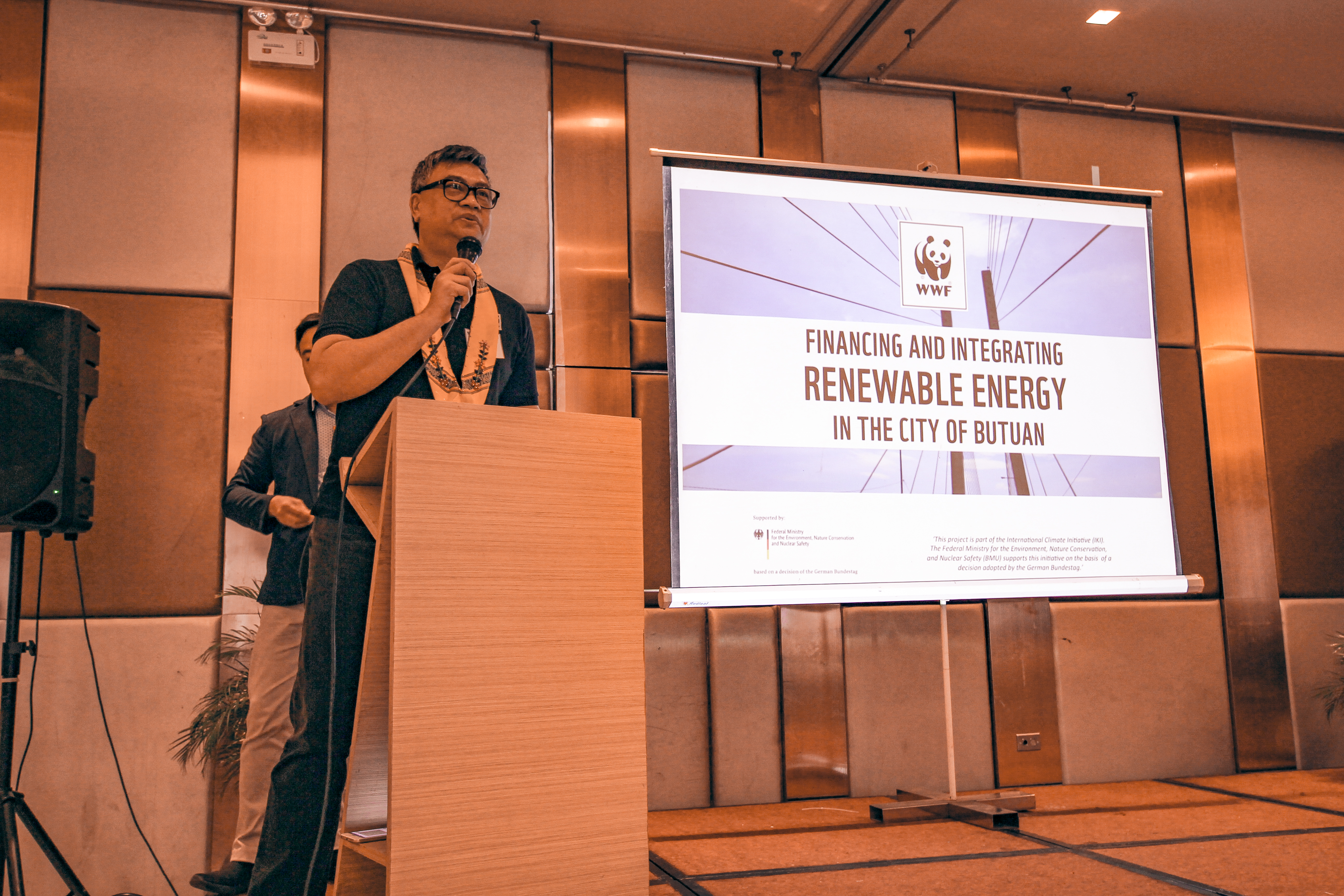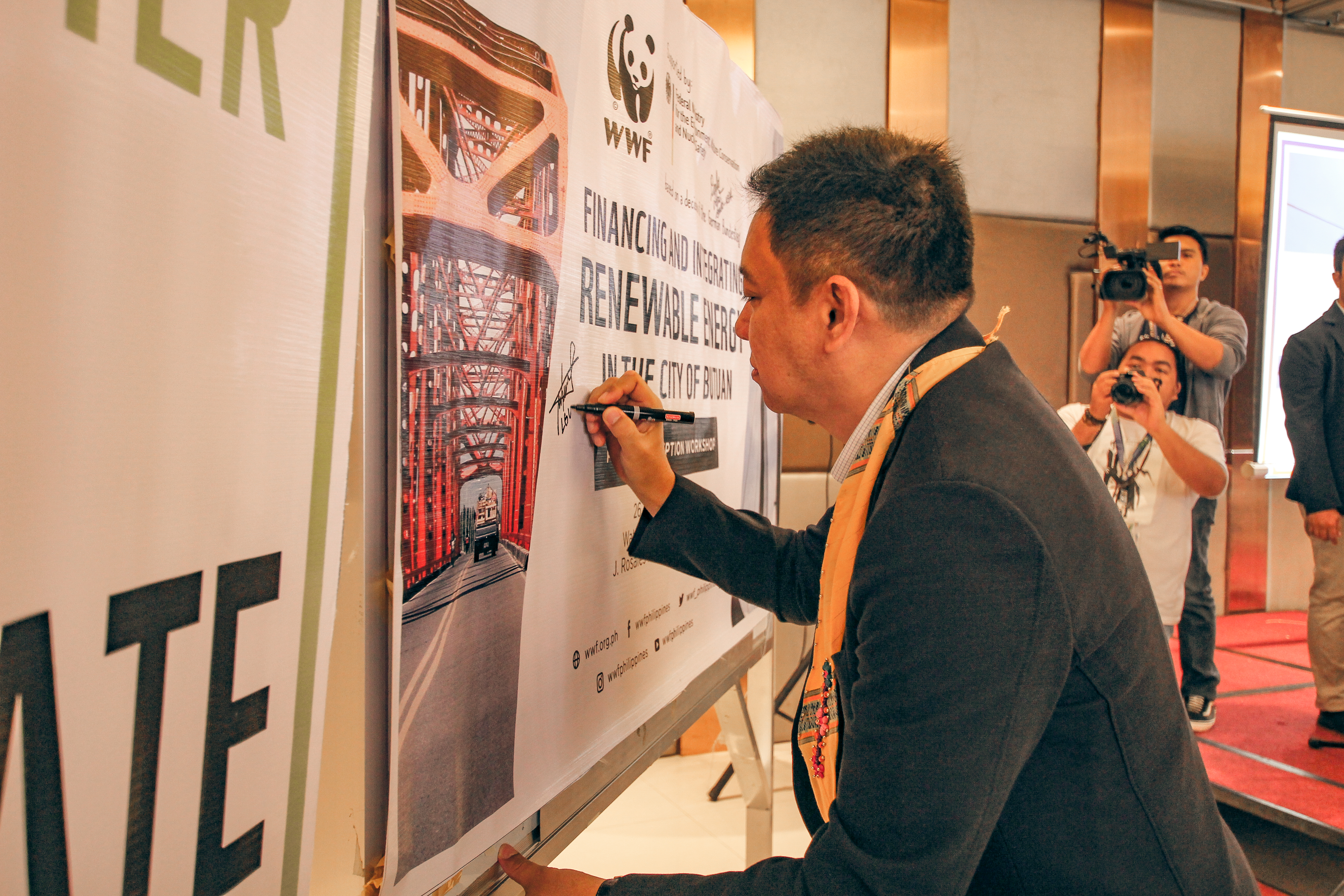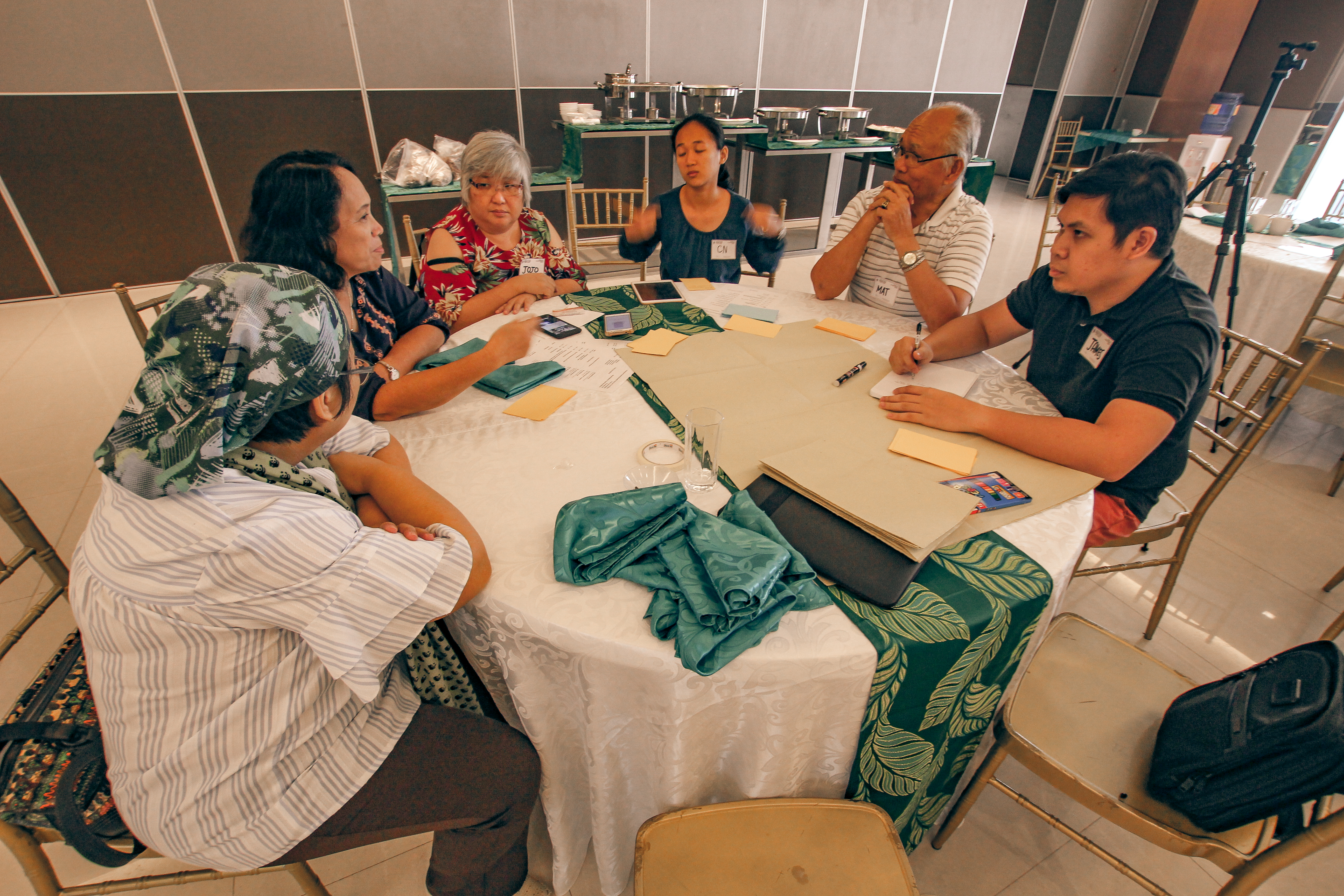WWF-Philippines Proposes a Bright Future for Butuan with the Financing and Integrating Renewable Energy in the City of Butuan (FinRE-BXU) Inception Workshop
October 2018

It’s all thumbs up for power planning and renewable energy with the key speakers and attendees of the FInRE Inception Workshop. © Alo Lantin / WWF-Philippines
Forward-looking optimism was the mood of the audience gathered at the Watergate Boutique Hotel in Butuan City for the recent launch and inception workshop of the World Wide Fund for Nature (WWF) Philippines’ Financing and Integrating Renewable Energy in the City of Butuan (FinRE-BXU) project.
This project is the latest in WWF-Philippines’ commitment to combatting climate change through the pursuit of clean and renewable energy in the country. Before coming to Butuan City, WWF-Philippines facilitated a decentralized power development planning process for the entire island of Palawan. This involved stakeholders both private and public, incorporating their interests and opinions and assigning roles that allowed all parties to be present in the planning process. The end result was a Palawan Province Power Development Plan for 2014-2035 that enabled the entry of a 20 MW renewable energy-centric power supply. The contract for this renewable energy source was signed into existence in 2015, making it the very first renewable energy arrangement involving the local energy cooperative in all of Palawan. WWF-Philippines is now looking to recreate this success in Butuan, this time with a city that sits on a national grid system, as opposed to being an area under the Special Power Utilities Group, or SPUG – that is to say, disconnected from any larger grids, as Palawan is.

WWF-Philippines CEO and President Joel Palma opens the FInRE Inception Workshop with a presentation on the current state of the world’s climate and its significance to mankind. © Alo Lantin / WWF-Philippines
“We identified Butuan as one of the cities that ought to be looked into in terms of power development plans because they needed, at the time, to really have more power because of rotating brownouts,” explained Atty. Angela Ibay, Head of WWF-Philippines’ Climate and Energy Program. Back in 2014, Butuan City was faced with power shortages that led to public clamour for energy solutions. While there was clear need to increase the cities’ energy capacity, WWF-Philippines saw an opportunity to further the reach of renewable energy. “It’s good that they’re looking into solutions, but it has to be renewable,” said Cheerylyn Agot, project manager of FinRE-BXU. “I think our presence was confirmation that renewable energy was no longer just talk, or just an idea, or just a principle.” Renewable energy sources can be found near the area, leaving the people of Butuan open to a number of possible solutions.
Prior to the launch of the FinRE-BXU project, WWF-Philippines held engagements with Butuan to explore the possible effects of climate change on the component city. These engagements determined a point of possibility – by investing in energy, Butuan would be able to attract businesses and investors that would otherwise have been turned off by issues of high energy rates and reoccurring blackouts that were plaguing the city. A delegation also met with Butuan City Mayor Engr. Ronnie Vicente Lagnada to impress the importance of looking into power solutions, while making a case for the pursuit of renewable energy.

Butuan City Mayor Engr. Ronnie Vicente Lagnada signifies his commitment to the pursuit of democratic power planning and the pursuit of renewable energy for his city. © Alo Lantin / WWF-Philippines
“It was always [the local government of Butuan] dictating the road map for us,” Agot continued, describing the multi-stakeholder nature of the project and the objectives of WWF-Philippines in Butuan as a facilitator of the interests of parties. Aside from the need for an increased supply of electricity to coerce development in the city, WWF-Philippines recognized that the pursuit should involve stakeholders from both the public and private sector. “That’s really the emphasis – that if the private sector gives their voice, government should be open to hearing them. This is another form of participation,” said Agot, stressing the importance of letting the public have a voice in matters of development. With interested parties including government institutions, private businesses, media groups and the academe, FinRE-BXU hopes to bring together all stakeholders and to allow them to lend their voices in directing the course in which Butuan’s energy planning process moves in.
Since FinRE-BXU looks to involve the public in the planning process, there is the possibility that developments lead toward fossil fuels as opposed to renewable energy. Despite this risk, however, the project team is optimistic. Atty. Ibay explained that the same democratic planning process was followed in Palawan, and that computations considered the cost of constructing a coal plant, considered to be the cheapest power source. These computations found that exploring renewable energy would, in fact, be cheaper, which factored significantly in the success of the Palawan project. “We think for Butuan,” explained Ibay, “that even if they were to include fossil fuels in their computations, at the rate the cost of renewables are going down there’s confidence that they won’t [pursue non-renewable energy sources].”
Aside from the WWF-Philippines and Butuan City representatives’ reiteration of the significance of climate change and its effects on mankind, the event also provided updates on Ambisyon 2040, the countries’ ideal development roadmap for the coming two decades courtesy of NEDA Assistant Secretary Carlos Bernardo O. Abad Santos. The roadmap was further contextualized for Mindanao by Mindanao Development Authority Acting Area Head for North Eastern Mindanao Lordilie Saliguma-Aljambre. Department of Energy’s Planning Chief Mr. Michael Sinocruz also discussed the Philippine Energy Plan prior to the breakout sessions where the participants were given the opportunity to brainstorm possible renewable energy solutions and the challenges those solutions may pose.

One of the four groups for the workshop sessions. The afternoon consisted of workshops that had the audience split into groups to brainstorm solutions to Butuan’s current power situation. © Alo Lantin / WWF-Philippines
There is hope yet for a renewable energy future for Butuan – a sustainable future defined not just by the government, but by those who call it home. “I think there’s a lot of potential that can be looked into. It’s a matter of planning it well,” remarked Ibay, expressing her hopes for the future of the FinRE-BXU project. With Palawan serving as the benchmark, the FinRE-BXU team still has much ground to cover before arriving at a renewable energy arrangement. Success at Butuan would represent a success for renewable energy and the capacity for a proactive public to dictate the direction in which their localities develop.
This project is part of the International Climate Initiative (IKI). The Federal Ministry for the Environment, Nature Conservation and Nuclear Safety (BMU) supports this initiative on the basis of a decision adopted by the German Bundestag.’
For more information, please contact:
Communications & Media Manager Mr. Dan Ramirez (dramirez@wwf.org.ph)
